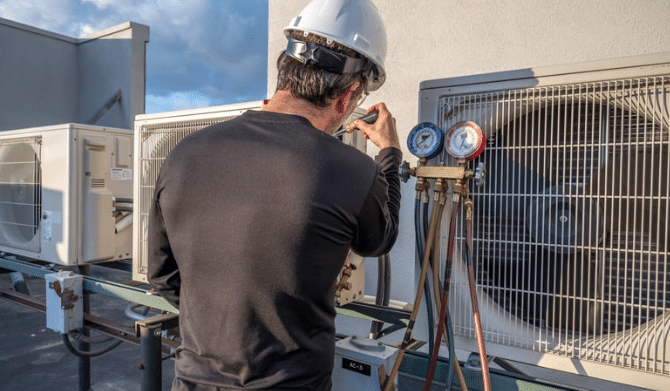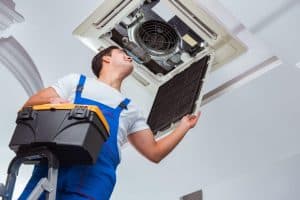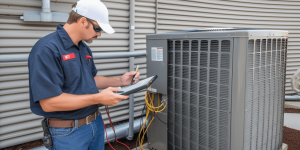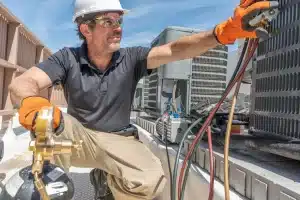Taking care of your HVAC system helps keep your home comfortable in every season. It also lowers your energy bills by allowing the system to run smoothly without consuming excessive power. A clean and working system won’t have to work too hard.
Regular checkups can catch minor problems early, before they become big, costly repairs. Fixing things early helps your system last longer and work better. This also means fewer sudden breakdowns, especially during very hot or cold days.
In this simple guide, we’ll walk you through an easy HVAC maintenance checklist. Following a regular HVAC maintenance plan can help you avoid trouble and keep your heating and cooling system functioning correctly.
Why HVAC Maintenance Matters
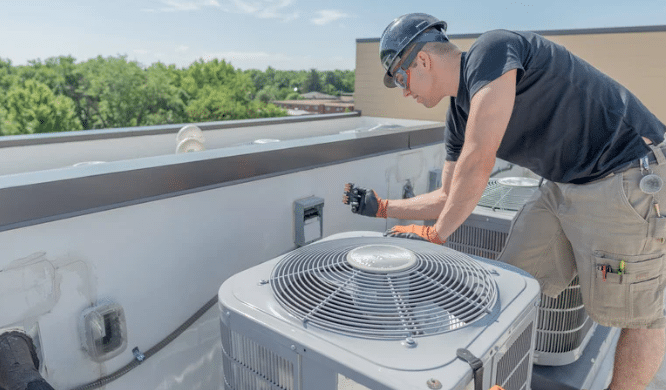
Your HVAC system works year-round to keep your home comfortable, but without proper care, it can lose efficiency and even fail prematurely. Regular maintenance ensures:
Lower Energy Bills
When your HVAC system is clean and running well, it doesn’t need to use as much power. This means your home stays cool or warm without wasting energy. As a result, your monthly utility bills decrease while your comfort level remains high.
Extended Lifespan
Taking care of your HVAC system helps it last longer. Addressing minor problems early prevents them from escalating into larger issues. This keeps your system running smoothly for more years, saving you the cost of buying a new one too soon.
Improved Air Quality
Changing air filters and cleaning ducts helps keep dust, dirt, and allergens out of your home. This makes the air you breathe cleaner and healthier. If someone in your home has asthma or allergies, clean air can make a big difference.
Fewer Breakdowns
Regularly checking your HVAC system helps identify and address issues early. This stops major problems before they start. Regular maintenance means fewer surprise repairs and less worry about your heating or cooling system breaking down when you need it most.
HVAC Maintenance Checklist for Homeowners
Whether you handle some tasks yourself or hire a professional, this HVAC maintenance checklist covers everything you need to keep your system in peak condition.
1. Replace or Clean Air Filters Regularly
Air filters catch dust and dirt, but they clog over time. A clogged filter makes your HVAC system work harder. Check filters every 1 to 3 months. Replace disposable filters and clean reusable ones to ensure the air moves properly.
2. Inspect Thermostat Settings
Your thermostat controls your HVAC system. Ensure it displays the correct temperature and functions correctly. If it’s outdated, consider switching to an intelligent or programmable model. This helps save energy and makes your system run more efficiently.
3. Clean the Condenser and Evaporator Coils
Dirty coils can make your system work harder. Remove leaves and dirt from the outdoor unit. Use a soft brush or hose to clean the fins. Inside, check the evaporator coil for dust and clean it if needed.
4. Check Refrigerant Levels
If your system isn’t cooling correctly, it may have a low refrigerant level. That usually means there’s a leak. A licensed technician should check and refill it. Never handle refrigerant yourself, as it’s dangerous and needs special training.
5. Examine Electrical Components
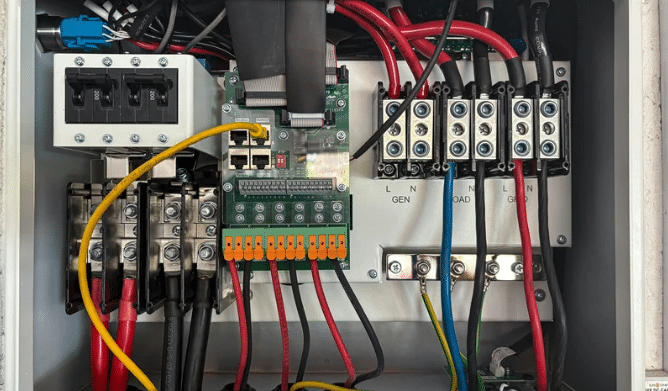
Worn or loose wires can cause your system to malfunction or even start a fire. Turn off the power before you look. If you notice frayed wires or rusted parts, contact an HVAC technician to make the necessary repairs safely.
6. Inspect and Clean Ductwork
Leaky or dirty ducts waste energy and lower air quality. Look for cracks or loose joints and seal them with mastic tape. If you see heavy dust or mold, get the ducts professionally cleaned to improve airflow.
7. Test the Blower Motor and Fan
The blower motor helps move air in your home. Listen for strange noises or check if the fan wobbles. Clean the blades and add oil if needed, following your system’s manual for safe care.
8. Clear Drainage Lines
Drain lines can clog with dirt or algae. Pour a water and vinegar mix through the line to keep it clear. If it’s already blocked, use a wet/dry vacuum to remove the clog and stop water damage.
9. Check Gas Connections (For Furnaces)
If you use a gas furnace, check for leaks. A hissing noise or rotten egg smell means danger. Leave your home right away and call the gas company. Don’t turn lights or appliances on or off.
10. Schedule Professional HVAC Maintenance
Even with basic upkeep, you still need a yearly check from a pro. A technician will check refrigerant, clean parts, and test your system. This helps your HVAC run safely and saves money on future repairs.
Seasonal HVAC Maintenance Tips
Keep your HVAC system ready year-round with simple seasonal tasks. This chart shows quick maintenance tips for spring and fall to boost comfort and efficiency.
HVAC Problems to Watch For
Even with a solid HVAC maintenance checklist, issues can arise. Be alert for:
Uneven Heating or Cooling
When some rooms are too hot and others too cold, your HVAC system may have problems. This can happen because of leaking air ducts or broken parts. Poor airflow also contributes to this issue, causing your system to work harder than it should.
Strange Noises
Loud or odd sounds like grinding, squealing, or banging from your HVAC system usually mean something is wrong. These sounds often come from loose or worn parts. It’s best to get help fast before the damage gets worse or more costly.
Frequent Cycling
If your system keeps turning on and off quickly, it may be short-cycling. This can happen because of thermostat problems, dirty filters, or low refrigerant. Short cycling wastes energy and can cause more wear on your HVAC system over time.
High Humidity Levels
Your HVAC system should keep your home’s moisture level balanced. If your house feels damp or sticky, there might be a clogged drain, blocked coil, or sizing issue. These problems make your system less effective and should be fixed right away.
When Should You Call a Professional for HVAC Maintenance
While many tasks can be DIY, some require expert attention:
Electrical Repairs
Electrical problems in your HVAC system can be dangerous and should only be handled by a trained technician. Issues like faulty wiring, broken relays, or blown fuses can stop your system from working right and may even create fire risks if ignored.
Refrigerant Handling
Handling refrigerant is not a DIY job. It requires special tools and certification. If your HVAC system is low on refrigerant or leaking, a professional should check it. Improper handling can harm your system and the environment, and it’s also against safety rules.
Gas Furnace Inspections
Gas furnaces should be inspected regularly by a professional. A professional can identify gas leaks, assess carbon monoxide risks, and ensure all components function safely. Skipping this step could lead to dangerous conditions and poor heating performance during cold months.
Complex Ductwork Issues
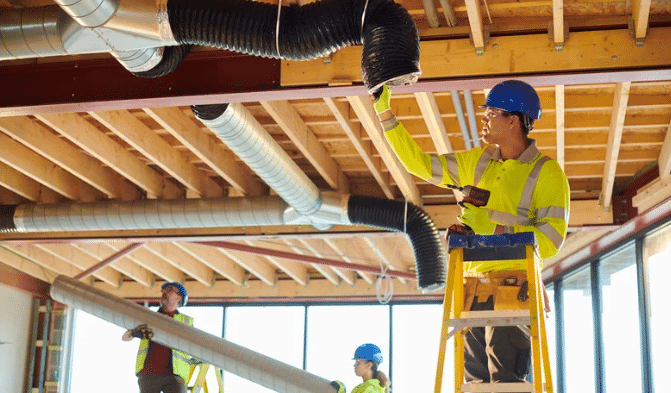
Ductwork problems, such as leaks, poor design, or blockages, can reduce airflow and waste energy. Fixing these issues the right way requires skill and the right tools. A trained HVAC technician can inspect your duct system to ensure air flows properly throughout your home.
Conclusion
Taking care of your HVAC system ensures your home remains comfortable throughout every season. A regular HVAC maintenance checklist helps you avoid big problems by catching minor issues early. It also helps your system run better and lowers your energy bills over time.
If your air isn’t as cool or warm as it should be, or if you hear strange noises, it’s best to check your system now. Regular care can prevent breakdowns and keep your heating and cooling systems working when you need them most. Simple steps today can save you money in the future.
AC Repair DFW offers fast, friendly HVAC repair service you can trust. From quick fixes to full checkups, we’ve got you covered. Call today 817-285-8000 to book your service. We’ll keep your home comfortable in every season, with care you can count on.
End Note
Stay comfortable all year with trusted help from AC Repair DFW. We offer reliable HVAC services to keep your home cool in summer and warm in winter. To learn more about our team and how we work, visit our About Us page.
Keep your system running smoothly with regular care. Our HVAC Maintenance Plans and Residential HVAC Maintenance Plans are built to save money and reduce breakdowns. For tips and helpful guides, check out our Blog filled with simple and useful advice.
Frequently Asked Questions
What Is the Maintenance Required for an HVAC System?
HVAC maintenance involves changing filters, cleaning coils, inspecting components, and testing the system. Performing this task once or twice a year helps keep your HVAC system running smoothly, saves energy, and prevents minor issues from escalating into major, costly repairs.
What HVAC Maintenance Should I Do?
Basic HVAC maintenance includes changing filters, clearing debris from the outdoor unit, checking the thermostat, and listening for unusual sounds. These easy steps help your system run longer and keep your home comfortable with clean air all year.
What Is a HVAC Checklist?
An HVAC checklist includes tasks like changing filters, cleaning coils, checking airflow, and testing the thermostat. It helps make sure your HVAC system works properly. Following this list helps you avoid breakdowns and keeps your home comfortable in every season.
What Are the Four Types of HVAC Maintenance?
The four types of HVAC maintenance are preventive, corrective, condition-based, and risk-based. They help your system run smoothly by preventing issues, resolving problems, monitoring performance, and focusing on components that are likely to fail.
What Are the 5 Pillars of an HVAC System?
The five main parts of an HVAC system are heating, cooling, ventilation, air filters, and controls. They work together to give clean, comfortable air. Taking care of each part helps your system last longer and use less energy.


